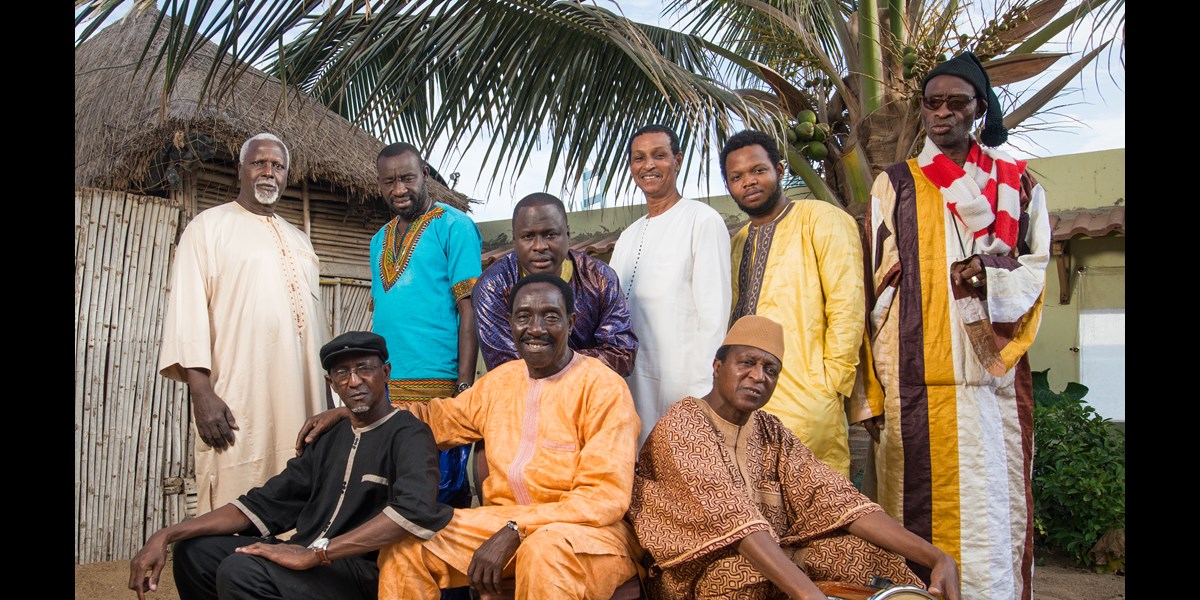Tuesday, February 20, 2018
Orchestra Baobab: A Beginner's Guide
Garth Cartwright marvels at the long-lasting appeal of the Senegalese band

(Photo: Youri Lenquette)
A simple, repetitive figure is picked on an electric guitar; it’s a serpentine sound and one of the most seductive in African music. Someone whistles enthusiastically, the drummer announces his arrival and the bass quietly slips in before a fat, juicy saxophone begins painting a picture of a tropical night sky. Then a voice, sleepy yet radiant, starts speak-singing. This is ‘Utrus Horas’, the opening tune on Pirates Choice, eight minutes and 43 seconds of stirring aural delight and a song that, over the past 35 years, has enchanted listeners across the world. ‘Utrus Horas’ is one of those recordings that sounds so distinctive, so evocative, it instantly conjures up images of West Africa as a land of sensual, elegiac pleasures. And the band who created this velvet smooth music of surprise and enchantment are Orchestra Baobab, an outfit who formed in Dakar, Senegal, in 1970 and who are about to release a fine new album.
Not that the Orchestra Baobab story is quite that simple. The original band came together around saxophonist Baro N’Diaye simply to play a Saturday night residency at the Baobab Club, a new Dakar club named after the famously squat West African tree. Baro poached five musicians from the Star Band – then Dakar’s most popular club band – and, with a couple of other young players, created a set that relied on both Cuban standards (Cuban dance music having gained great popularity in West Africa), alongside an infusion of West African music, encouraged by the independence movement in neighbouring Guinea for local artistry.
Baobab’s musicians found themselves creating an effortless blend of Latin and African music, and by bringing in musicians from different tribal regions they featured both Mandinka and Wolof singers who, throughout the 70s, established themselves as Senegal’s most popular band. Their fluid lineup saw a variety of musicians come and go until the core of the band was established by the late 70s: vocalists Ndiouga Dieng (a Wolof griot), Balla Sidibe and Thione Seck; saxophonist Issa Cissoko and guitarist Barthélémy Attisso from Togo.
While Baobab’s line-up continued to fluctuate – being working musicians, members would leave to join other bands or pursue different projects – their popularity remained strong and the band’s distinctive saxophone and guitar sound marked them out as something special. So much so that in 1978, they travelled to France in search of European stardom. While they enjoyed some prowess in Paris – including being hired to play at the wedding of fashion designer Pierre Cardin’s daughter – this adventure turned out to be unprofitable and the band returned to Dakar in 1979.
By now the Baobab club had closed but the band were so popular they could perform all over Senegal, commanding fees of US $4,500 a show. They regularly recorded and released cassettes and it was a 1982 cassette, soon to be known internationally as Pirates Choice, that featured the six songs that would establish Orchestra Baobab internationally. Ironically, as these songs began winning them fans in Paris and London, Orchestra Baobab were being overtaken in Senegal by a young musician who had left the Star Band to go solo: Youssou N’Dour. His more percussive, funk-influenced sound appealed to the young and Baobab desperately tried to keep up by changing their sound – even hiring two female vocalists at one point.
Yet it was not to be and, in 1987, Orchestra Baobab called it a day. By then Thione Seck had left the band and established himself as one of Senegal’s most popular solo artists while Attisso left music to set up a law practice. When the British label World Circuit released Pirates Choice in 1989, Charlie Gillett and John Peel championed Baobab on their radio shows. In 2001 World Circuit reissued it as a double CD and such was the acclaim that greeted this edition that the band’s core members, all now middle aged and settled down, agreed to reform for a European tour.
Their triumphant return to London’s Barbican Centre in May 2001 launched them onto the Western world music festival and tour circuit. Yet unlike their Parisian experience in 1978, Baobab now found large audiences cheering them across the world. They returned to the studio in 2002, releasing Specialist in All Styles album, which won two BBC Radio 3 Awards for World Music. Ironically, in Senegal Orchestra Baobab are now deemed old-fashioned but they continue to command a wide international following.
This month sees the band release a new album, Tribute to Ndiouga Dieng, in honour of one of their long-standing original vocalists who died in November 2016. For several years Dieng’s son Alpha had been a member of the band, following the griot tradition of father teaching son the techniques needed to be a master vocalist.
Ironically veteran guitarist Barthélémy Attisso has chosen to sit this one out and focus on his law firm so the band have drafted in kora player Abdouleye Cissoko from the Casamance region in southern Senegal – the first time the group have numbered a kora player in its permanent ranks but Cissoko’s rippling strings have blended seamlessly into the sound and lent a fresh dynamic. There’s also a trombonist, Wilfred Zinzou, another first for Baobab.
It is this willingness to consistently push their lush yet imaginative sound forward that stops Orchestra Baobab simply existing as a nostalgia act.
Best albums
Pirates Choice
(World Circuit, 2001)
These seminal 1982 recordings are remastered here with six extra tracks (also excellent) and sleeve notes by the late, great Charlie Gillett. Perfection!
Specialist in All Styles
(World Circuit, 2002)
Having reformed and toured widely, a rejuvenated Orchestra Baobab entered the studio and proved they were way more than a nostalgia act. A strong return that shows the band sounding like they’d never been away. A Top of the World review in #14.
Made in Dakar
(World Circuit, 2007)
A delightful mix of new compositions with some classic hits from their 70s heyday, the band sound better than ever. The Songlines review described them as ‘the Senegalese Skatalites’ in #47.
La Belle Époque
(Syllart, 2009)
For fans of Pirates Choice and more recent efforts, this double CD of their early stuff shows a nightclub band developing their distinctive blend of African and Latin music. Not as polished as their more famous releases but still very tasty. Reviewed in #62.
Tribute to Ndiouga Dieng
(World Circuit, 2017)
This album features few of the original members – although Thione Seck returns to sing on one song for the first time in decades while disciple Cheikh Lô also drops by – and thus features a younger line-up pushing forth a classic yet not imitative sound. An inspired effort. Reviewed in #127.
IF YOU LIKE ORCHESTRA BAOBAB, THEN TRY:
Mahmoud Ahmed
Éthiopiques Vol 6: Almaz (Buda Musique, 1999)
TAs with Pirates Choice, the release of this album blew minds when released by Buda and won Mahmoud Ahmed a wide following across the West. The album offers a north-east African hybrid akin to Baobab’s in its use of Latin and soul flavours while sounding even more exotic and eerie.
Senegal's legendary band Orchestra Baobab celebrates its 50th anniversary this year with a new album, single and tour '50 ANS' - paying tribute to the different generations who have inspired this group’s five magnificent decades of musical joy. To see them at KOKO on Thursday, 02 May, 7:00 pm, click here.
This article originally appeared in the April 2017 issue of Songlines (#126) magazine. Never miss an issue – subscribe today
Want to DISCOVER the WORLD through MUSIC? Subscribe to Songlines' FREE newsletter here







